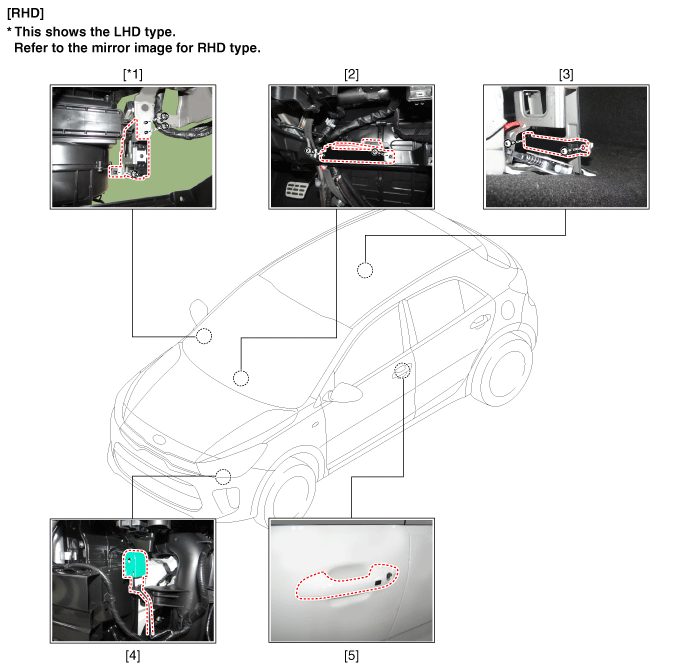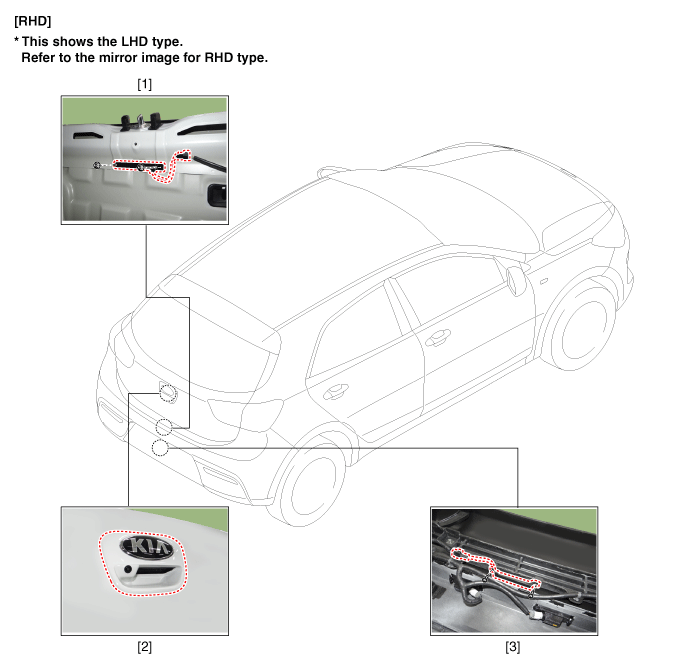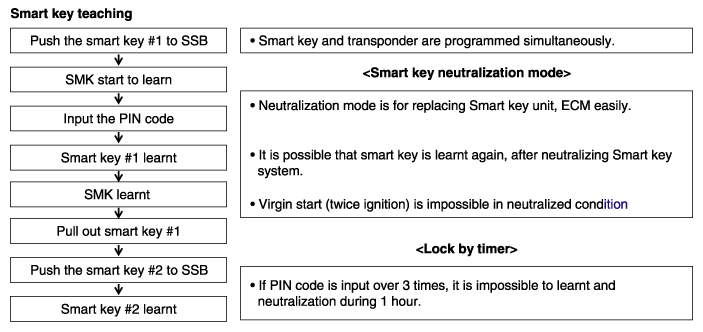Kia Rio: Body Electrical System / Smart Key System
Specifications
| Specifications |
Smart Key Unit
|
Items |
Specification |
|
Rated voltage |
DC 12 V |
|
Operating voltage |
DC 9 - 16 V |
|
Operating temperature |
-31 - 167°F (-35 - 75°C) |
|
Load |
Max. 4mA (When welcome light function "OFF") |
RF Receiver
|
Items |
Specification |
|
Frequency |
433.92 Mhz |
|
Antenna type |
FSK (Frequency Shift Keying) |
Smart Key Fob
|
Items |
Specification |
||||||||
|
Battery |
Lithium battery 3V 1EA |
||||||||
|
Distance |
- The distance over which RF(Radio Frequency) Receiver can receive a FOB
transmission signal : 30m - The distance over which LF(Low Frequency) antenna(Outer Handle/ Trunk/ Tailgate) can detect FOB : 0.7m |
||||||||
|
Battery life |
More than 2 years (10 times / a day)
|
||||||||
|
Push buttons |
3 (Door lock / unlock, Tailgate) |
||||||||
|
Frequency(Rx) |
125 kHz |
||||||||
|
Frequency(Tx) |
433.92 MHz |
||||||||
|
Numbers |
2EA |
Antenna
|
Items |
Specification |
|
Rated voltage |
DC 12 V |
|
Operating voltage |
DC 9 - 16 V |
|
Operating temperature |
-22 - 167°F (-30 - 75°C) |
|
Frequency |
125kHz |
|
Numbers |
Interior (3EA), Door (2EA), Bumper (1EA) |
Components and components location
| Component Location (1) |

| 1. Smart key unit (SMK) 2. Interior antenna 1 3. Interior antenna 2 |
4. Buzzer 5. Door outside handle / Door antenna |
| Component Location (2) |

| 1. Tailgate antenna 2. Tailgate open switch |
3. Bumper antenna |
Description and operation
| Description |
The SMART KEY system is a system that allows the user to access and operate a vehicle in a very convenient way. To access the vehicle, no traditional key or remote control unit is needed.
The user carries a SMART KEY FOB which does not require any conscious actions by the user (e.g. operate a RKE button). The SMART KEY system is triggered by pressing a push button in the door handle.
After being triggered the vehicle sends out a request in a limited range. If the SMART KEY FOB receives this request, it automatically sends a response to the vehicle. Then the system decides whether to perform a particular action (unlocking, locking…) or remain inactive.
Again, a communication between the vehicle and the SMART KEY FOB is needed before any actions will be performed.
The System offers the following features :
| • |
Passive unlock via 4 doors |
| • |
Passive locking via4 doors |
| • |
Passive start |
| • |
Passive access tailgate via the tailgate lid switch at the tailgate |
| • |
Max. 2 fobs can be handled by the system |
| • |
Immobilizer backup antenna driver integrated into SSB for TP authentication (i.e. limp home mode) |
| • |
Communication with engine management system |
| • |
Communication with SRX |
| • |
LF-RF communication |
| 1. |
Passive unlock The system allows the user to access (unlock) the vehicle without performing any actions with the SMART KEY FOB. |
| 2. |
Passive locking The system allows the user to lock the vehicle by pushing a button on door handle with the SMART KEY FOB. |
| 3. |
Button start The system allows the user to switch the power modes (Off, Accessory, Ignition), as well as to start and stop the vehicle’s engine without performing any actions with the SMART KEY FOB. See Button Engine Start system specification. |
| 4. |
LIMP HOME Mode Additionally, the system offers so called “limp home mode”, which is the user can operate all vehicle functions by pushing the key into the SSB. |
Smart Key ECU (SMK ECU)
The SMK ECU manages all functions related to "Passive Unlock", "Passive Lock" and "Passive Authorization for Engine Start Operation".
It reads the inputs (Push button in door handle, Start Stop Button (SSB), PARK position Switch), controls the outputs (e.g. exterior and interior antennas), and communicates via the CAN as well as a single line interface to further devices of the car.
For communication with the SMART KEY FOB, SMK ECU generates a request (challenge) as an encoded and modulated 125kHz signal at the inductive antenna outputs and receives the SMART KEY FOB’s response via the external RF receiver.
The main functional blocks of the SMK ECU are :
| • |
Power supply |
| • |
Microcontroller with FLASH Memory |
| • |
Single Line Interface to SRX |
| • |
Single Line Interface to EMS |
| • |
Input stage |
| • |
LF antenna amplifier/driver |
| • |
CAN communication with BCM |
The LF antenna amplifier/driver generates a 125kHz sinusoidal carrier signal which is distributed to the different antennas.
Smart Key FOB
The system supports up to 2 SMART KEY FOBs.
The main functions of the SMART KEY FOB are :
| • |
Passive functionality: receives LF-challenge and sends automatically RF response. |
| • |
Classic RKE function by action up to 3 push buttons. |
| • |
Transponder-functionality in case of a flat battery or a disturbed communication. |
Antennas
| 1. |
Emitting LF Antennas : Inductive antennas in and at the vehicle are used to transform the current, driven by the SMK ECU antenna driver, into a 125 (or 134.2) kHz magnetic field, which is the carrier for the SMART KEY challenge. Three antennas cover the vehicle’s exterior: two antennas in the Door Handles (DS and PS) cover the area around the doors; one antenna in the rear bumper assemblys the area around the trunk or tailgate. Up to three antennas cover the vehicle’s interior and the trunk or tailgate interior: two in the passenger compartment and one in the trunk room or trunk. |
| 2. |
Bidirectional Immobilizer Antenna (for Limp Home): The Immobilizer Backup Antenna is used for sending and receiving data: it emits a magnetic field (125 - 135 kHz challenge) and receives changes in the field strength (response of Transponder). |
| 3. |
Receiver The SMART KEY FOB’s response is received via the RF receiver. |
Door Handle
The front door handles of the two doors (driver door / passenger door) are equipped with emitting LF-antennas to emit the 125kHz signals. The front door handles are also equipped with a push button.
Push Button
The push button in door handle serves as a trigger to indicate the user’s intent to unlock or lock the vehicle.
The push buttons are installed at front doors, integrated into the door handles.
Another button is installed at the trunk or tailgate lid.
| Operation |
Passive Functions
The system allows the user to access the vehicle without having to perform any actions (e.g. RKE button pressing) with the SMART KEY FOB. It is sufficient that a valid SMART KEY FOB is located within a defined and limited range with respect to the vehicle. So the system is capable of detecting and authenticating a SMART KEY FOB in the ranges as specified below.
| Operating Range |
The SMART KEY FOB receives and interprets a challenge sent from the vehicle via the exterior antennas in a free space range of min. 0.7m measured around the exterior antennas which are integrated in the door handles; refer to the below given picture. The trunk or tailgate access range is also min. 0.7m measured from the antenna position.
The SMART KEY FOB receives and interprets a challenge sent from the vehicle via the exterior antennas in a free space range of min. 0.7m measured around the exterior antennas which are integrated in the door handles; refer to the below given picture
Passive Access (Passive Entry)
Push the door handle button when all doors locked indicates the operator’s intent to access the vehicle and thus triggers the system for unlock
Passive Locking (Exit)
Pressing one of the push buttons in the door handles when one of the following condition is fulfilled:
| • |
At least one door is unlocked and two_steps timer is not running or |
| • |
Two_steps timer is running and one of the push button except Front Left side is triggered |
indicates the operator’s intent to lock the vehicle and thus triggers the system for a lock.
Passive tailgate Warning (Sedan only)
Whenever the tailgate is closed, SMK ECU uses a suitable search strategy to avoid tailgate buzzer warning by a fob outside the vehicle. Then SMK searches for a SMART KEY FOB in the interior of the tailgate. If a valid SMART KEY FOB is found in the tailgate, the SMK ECU activates SMK external buzzer (TBD) to inform the user that the tailgate has been closed with a fob inside the tailgate.
SMK will send the tailgate open command to BCM for tailgate reopening if tailgate reopening bit is set(BK)For this functionality, a “valid” SMART KEY FOB means any SMART KEY FOB that belongs to the vehicle, even if it’s DEACTIVATED.
|
Smart Key Reminder 1
| 1. |
Preconditions : All terminals OFF & at least one door open & locking status is not locked checked by SMK periodically every 100ms, as long as CAN/LIN active. |
| 2. |
Event: At least 1 door knob status changed from unlock to lock. |
| 3. |
SMK actions :
If no fob or no TP has been found, no action is required. If any valid fob or valid TP has been found, SMK unlocks the vehicle by sending a CAN Key Reminder unlock message with the fob number. If any valid fob has been found, SMK unlocks the vehicle by sending a CAN/LIN Key Reminder unlock message with the fob number. |
Smart Key Reminder 2
| 1. |
Preconditions : All terminals OFF & any door (including tailgate) open & no FOB-IN & no locking status (checked by SMK periodically every 100ms, as long as CAN/LIN active) |
| 2. |
Vehicle action : Closing last door or tailgate with knobs locked state, or with a locking in progress |
| 3. |
SMK actions : Before elapsing 500ms after the closing if all doors are locked then :
If no fob has been found, no action is required. If any valid fob or valid TP has been found, SMK sends unlock command via CAN and activates ext. buzzer warning. If any valid fob has been found, SMK sends unlock command via CAN/LIN and activates ext. buzzer warning. |
Smart Key Door Lock Warning
Door Lock Warning 1
| 1. |
If terminal state is ACC or IGN and all doors are closed and that user triggers a SMK lock, a search is started at the exterior of the vehicle from the side of the trigger. |
| 2. |
If no valid Fob is found no action is required, but if a valid Fob is found then a Buzzer warning shall be started. |
| 3. |
If "tailgate Option == On" and "tailgate LockUnlockOption == On" are fullfilled, Lock warning is including tailgate as a door and tailgate lockunlock knob as a door unlock switch. |
Door Lock Warning 2
| 1. |
If terminal state is OFF and not all doors are closed and that user triggers a SMK lock, a search is started at the exterior of the vehicle from the side of the trigger. |
| 2. |
If no valid Fob is found no action is required, but if a valid Fob is found then a Buzzer warning shall be started. |
| 3. |
If "tailgate Option == On" and "tailgate LockUnlockOption == On" are fullfilled, Lock warning is including tailgate as a door and tailgate lockunlock knob as a door unlock switch. |
Door Lock Warning 3
| 1. |
If terminal state is OFF and ATWS is considered as Disarmed and all doors are closed and that user triggers a SMK lock, a search is started at the Interior of the vehicle; |
| 2. |
if no valid Fob is found the search for SMK locking will be started, but if a valid Fob is found then a Buzzer warning shall be started. |
| 3. |
If "tailgate Option == On" and "tailgate LockUnlockOption == On" are fullfilled, Lock warning is including tailgate as a door and tailgate lockunlock knob as a door unlock switch. |
Smartkey Lamp Warning
| 1. |
If terminal state is ACC or IGN and vehicle speed is less than 3km/h, a periodic search (every 3s) is done at the interior of the vehicle to check that the valid fob is still in the in the vehicle. |
| 2. |
If no valid Fob is found a Warning is started, but if a valid Fob is found then no action is started. |
Failsafe Functions (Backup For Limp Home)
In case of a discharged battery of the SMART KEY FOB or disturbed transmission, the following functions are available:
| • |
Unlocking / locking of doors or trunk (or tailgate depending of the vehicle configuration): use of mechanical key |
User Information Functions
| ID OUT Warning |
| 1. |
Preconditions :
|
| 2. |
Event: The last opened door is closed |
| 3. |
SMK action : SMK searches for a SMART KEY FOB in the interior.
|
|
Fob Battery Low Voltage Detection
To detect fob low battery condition, certain battery voltage measurement and low voltage detection strategy are implemented into fob. The measurement of the battery voltage will be done if fob button is pressed or if a LF measurement command is received.
Learning Description
In this chapter, the learning procedure for SMK and FOBs is described.
For the learning of the SMK and FOBs, it's necessary to have a connection to the diagnostic tool.
Learning MODE
Whatever the mode, the learning procedures are managed by the SMK.
Prior to start learning service, Fob-In signal must be active and the vehicle secret code (called as PIN code) should be known.
Teaching MODE
This mode is used by the dealers in order to replace SMK and/or the set of keys, or to register additional keys for an existing system. That means the system already has been learnt with certain PIN Code. The PIN Code is fixed for the life time of the vehicle, therefore the same PIN Code must be used in this mode. Otherwise learning will be failed
Teaching MODE Procedure Description (Step By Step)
Objective : Key teaching procedure at service station
Initial state :
| – |
SMK replacement : SMK is not learnt and SMART FOB are already learnt with same PIN code |
| – |
Additional or new keys teaching: SMK are already learnt with same PIN code |

Starting After Replacing (Virgin Start)
Starting is possible by following process after replacing new smart key unit, FOB key.
| • |
It is for starting at virgin condition |
| • |
All related parts are virgin condition (Smart key, ECM) |
| • |
Press brake pedal in P or N range |
| • |
Push the start button once with virgin smart key. |

 Seat Heater Switch
Seat Heater Switch
Components and components location
Components
1. Driver side seat heater switch
2. Passenger side seat heater
switch
Description and operation
...
 Smart Key
Smart Key
Repair procedures
Smart Key
Smart Key Code Saving
1.
Connect the DLC cable of KDS/GDS to the data link connector (16 pins)
in driver side crash pad lower panel, turn ...
Other information:
Kia Rio 2017-2020 YB Service Manual: Fluid
Repair procedures Inspection Automatic Transaxle Fluid (ATF) Level Check 1. Place the vehicle on a level ground. 2. Start the engine to warm up the ATF. 3. Check by using KDS/GDS that the temperature of the ATF is b ...
Kia Rio 2017-2020 YB Owners Manual: Rocking the vehicle
If it is necessary to rock the vehicle to free it from snow, sand, or mud, first turn the steering wheel right and left to clear the area around your front wheels. Then, shift back and forth between 1st (First) and R (Reverse) in vehicles equipped with a Manual Transmission or R (Reverse) and ...


